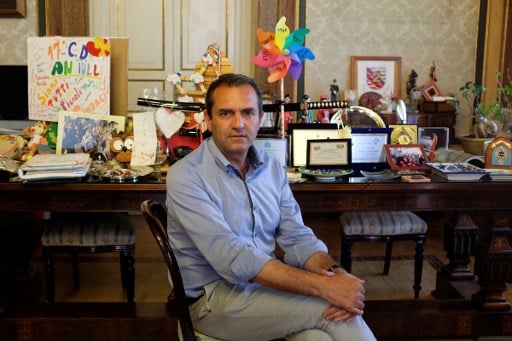The outspoken Mayor of Naples Luigi de Magistris yesterday attacked Interior Minister and Deputy PM Matteo Salvini's “great sense of opportunism” and accused him of exploiting the image of the police force.
“Minister Salvini recently loves to wear sweatshirts, jackets, and various badges of the State Police,” he wrote on Facebook.
“I’m not talking about occasionally wearing a hat, a uniform or a badge on an official state visit,” he added, accusing Salvini instead of “exploiting” the image of the police force.
Salvini’s habit of often wearing the jackets and even full uniforms of Italy’s emergency services for press conferences and photo opportunities has also drawn anger from the country’s fire brigade.

Salvini takes a selfie for social media wearing the uniform of the Italian fire brigade. Photo: Matteo Salvini/Twitter
“I don't rule out the hypothesis that, in Salvini's delusion of omnipotence, he really thinks he has become a policeman, a sort of political head of the police,” Mayor Luigi de Magistris wrote. “I could suggest some investigative paths for him to pursue.”
“Firstly, investigate yourself as the leader the League to find the 49 million euros that, according to the judiciary, were illegally taken away from the Italian people.”
He was referring to a case of fraudulent use of party funds in which Umberto Bossi, founder of the League (previously known as the Northern League) and the party's former treasurer were convicted and forced to step out of the public eye.
READ ALSO:
Naples’ mayor has been among the local politicians critical of Salvini and his party’s policies since the far-right League came to power last year, as part of a ruling coalition with the populist Five Star Movement.
The mayor, an anti-mafia prosecutor elected by the city in 2011, most recently clashed with the Interior Minister after he joined several other Italian mayors in refusing to implement parts of the government's controversial security decree, saying they were “unconstitutional”.
Naples also defied Salvini’s orders to close Italian ports to rescue ships, recently saying its port was open to Sea Watch, an NGO ship that had been stuck at sea and unable to dock with 32 migrants on board.
Salvini previously dismissed the mayors' criticism and insinuated that thse who disagreed with parts of his decree were benefiting from the migrant reception business, tweeting: “Certain mayors look back fondly on the good old times of immigration, but for them the party is over!”
Salvini continues to repeat that the ports are closed, claiming yesterday that closing ports saves lives.
I porti sono e rimangono chiusi!#Vasto #Abruzzo #10febbraiovotolega pic.twitter.com/ZLOtM2AvbK
— Matteo Salvini (@matteosalvinimi) January 20, 2019
The Mayor has a history of refusing to follow government orders after defying a 2014 ban on registering gay marriages that had taken place abroad. Italy today still does not legally recognise gay marriages.
De Magistris also accused Salvini of “political thought characterised by racial discrimination and xenophobia.”
He said that Salvini had a “great sense of opportunism which is used unscrupulously against the weakest.”
READ ALSO:



 Please whitelist us to continue reading.
Please whitelist us to continue reading.